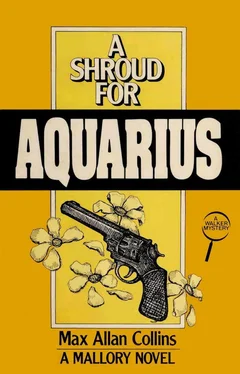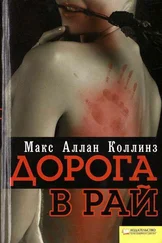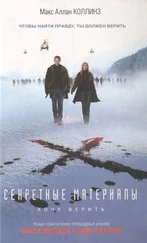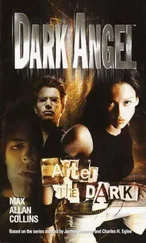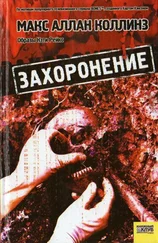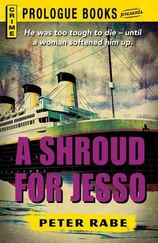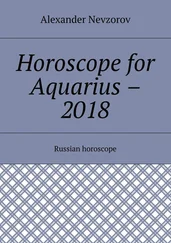The Used Book Exchange was on a commercial strip that seemed, for a couple blocks anyway, to be a hippie ghetto. The shop was stuck between a co-op health-food grocery store whose window bragged about its prices on tofu and sprouts, and a restaurant seeking to pull hungry folks off the street with the lure of soy burgers. Just across the way was a used-record store cum head shop, next to which was a seedy-looking new-wave/punk bar advertising its next band via graffiti in its own window: The Reaganomics, the band seemed to be called. The Exchange itself was like a dining car, one end of which was stuck rudely toward the street, a narrow storefront with brightly colorful big letters spelling out its name in the window; smaller, the words MOVIE POSTERS and USED COMICS were also spelled out, and some comic books were propped up in the window, underground comics ( Zap, Freak Bros., Mr. Natural ) mingling with superheroes ( X-Men, Batman, Fantastic Four ); all were sixties vintage. The shop opened at ten, and it was just after that now, so the OPEN sign was turned my way in the door. In I went.
The shop’s interior was deep, a surprisingly tidy room where a wall of books on either side faced several aisles of bookcases that stood taller than me; paperbacks mostly. Just inside the door, to my left as I came in, was a squared off counter, a little newsstand-like structure, behind which a skinny, balding, bearded man sat on a stool by the cash register reading a magazine called Denver Quarterly.
Despite its being summer, the man wore a green lint-flecked sweater; of course — an ancient air conditioner chugged in a port in the window behind him, and it was fairly chilly up in the front of the narrow shop. Hanging from thumbtacks at just above eye level from a wooden strip atop the newsstand-like counter were comic books from the fifties: Superman, Little Lulu and, I was pleased to note, Sgt. Bilko (half a dozen boxes of old comics stood on the floor in front of the counter). Also hanging from thumbtacks were 8-by-10-inch glossies of movie stars, ranging from Clint Eastwood to Clark Gable, from Woody Allen to the Three Stooges. A sign advised that movie posters were available; just ask — and various posters were taped to the ceiling — Superman, Return of the Jedi, Indiana Jones and the Temple of Who Cares. No blown-up covers of Denver Quarterly.
J.T. O’Hara nodded at me (I was in a black T-shirt and jeans today), smiled, said, “Let me know if you need some help,” and went back to reading his literary magazine, not recognizing me.
I browsed for a while. The place was very orderly, broken into sections, with historical romance and Harlequin romances and other women’s paperback pulp dominating; the mystery section was in the back, and I found a copy of one of my books there, personally inscribed to somebody at some book-signing I’d done — glad to see my personal touch had meant so much. I also found a couple first printings of Mickey Spillane and Roscoe Kane paperbacks, picked ’em up. Everything within a given section was in alphabetical order; O’Hara was doing a good job with the little shop — it was hardly the jumble many such paperback exchange shops are — and his hippie roots were only showing here and there, such as in the extremely left-wing political section. Those roots were especially showing in the poetry section, where prominently displayed among Yeats and McKuen were several chapbooks by J.T. O’Hara, published by Toothpaste Press of West Branch, Iowa. The newest was entitled A Shroud for Aquarius. I thumbed through the little book, found the title poem, next to a grainy sepia photograph of a sun going down, or maybe coming up.
Find tie-dye linen
To lay her to rest
Shed paisley tears
Aquarius sets
That almost rhymed, but I wasn’t sure if it was supposed to. I didn’t know whether it was a good poem or not (though I might venture a guess: not) but at least I could tell what it was about.
I carried a copy of A Shroud for Aquarius up to the counter, along with my Spillane and Kane, dug six bucks out of my billfold; the sale of his own book perked J.T. O’Hara up. So did the odd literary company I’d placed him in, I think. He put the literary magazine he’d been reading face down on the counter, fanned open to where his place was.
“Mickey Spillane and I seldom find the same readers,” he said, slate eyes coming alive, sliding the books into a used paper bag, “but I salute your catholic taste.” He was my age though his crow’s feet were deeper. It’s not that I look young for my age — it’s just that he didn’t. The full but carefully tended beard could not hide deep lines, and gray freely mingled with the brown of his hair and beard. He was an old hippie, all right, but he did not have the drugged-out, burnt-out look in his eyes that normally characterizes the breed.
“I found the title poem very interesting,” I said.
“Really? Not much of a poem. Something I scribbled off.”
“Why would you name the volume after what you see as one of your lesser poems?”
He shrugged; he was my size but skinnier, and looked frail — shrugging seemed a risk. “The editor at Toothpaste Press suggested the title for the collection. Said it summed up what all the poems in the volume are about.”
“The end of the sixties, you mean.”
His eyes brightened further. “Right. The dreams that didn’t come true. The idealism that turned to ash.”
“Those were the good old days, by your way of thinking.”
“Sure! Never better. Something was in the air.”
“Yeah,” I said. “Pot smoke.”
“Mallory,” he said, standing. Eyes narrowing. “I didn’t recognize you at first.”
“What gave me away, finally?”
“The cynicism. You’re here to talk about Ginnie, I suppose.”
“Yes I am. I’m surprised you recognized me at all. We only met a couple of times.”
“Ginnie spoke of you often. You were her best friend, growing up.”
“I always thought of her as my best friend,” I admitted. “It’s nice to hear that she felt the same about me.”
“You really loved Ginnie, didn’t you?”
He meant “loved” in the sixties sense; he knew there’d never been anything romantic between us.
“Yes I did,” I said. “Even though we drifted apart.”
He smiled; his teeth looked a little bad. “Not everybody was able to love Ginnie. She had her faults.”
“She had a tongue like a knife,” I said.
“You’re a poet yourself,” J.T. said, “albeit of the Raymond Chandler school. My memories of Ginnie’s tongue conjure rather more lyrical images than a blade. But I’ll grant you her temper could slash you.”
“Did her temper ever slash you ?”
He risked another shrug. “From time to time. The sort of wounds that don’t ever heal completely; but neither do they debilitate.”
“Why did you live apart?”
“Why did we live together?”
“Because you loved each other?”
“A reasonable assumption.”
“J.T.,” I said, “we’re alone here. There’s no one else in the store. You don’t have to talk in circles. Life isn’t a poem.”
“But it is poetic.”
“Justice is, sometimes — not life. If you still loved Ginnie, and she still loved you, why didn’t you stay together? When did you split, exactly?”
He sat back down. “Two years ago.”
“Why?”
“I loved her too much to be a part of it.”
“A part of what?”
“Her life. And I didn’t want Mal to be part of it, either.”
He meant their four-year-old daughter, Malinda; I knew that was what he meant almost at once, but hearing the name attached to Ginnie’s child jarred me, just the same.
Читать дальше
